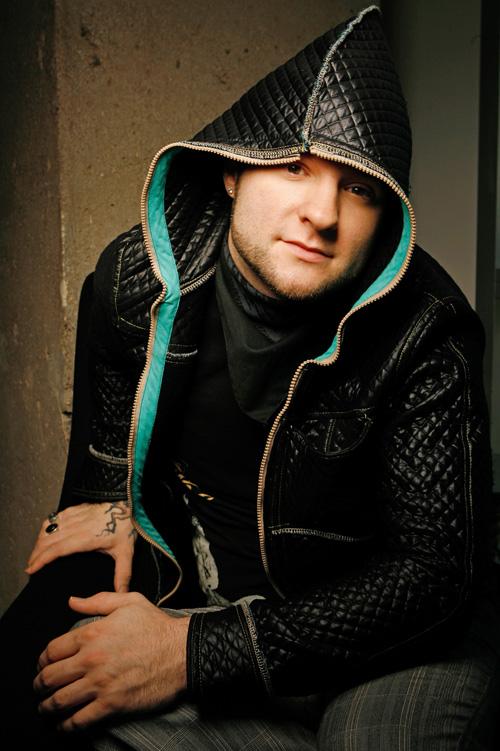‘American Idol’ runner-up Blake Lewis looks to move beyond the show with own music
Singer Blake Lewis poses for a photo at the “19” Agency offices on Nov. 21 in Los Angeles. Damian Dovarganes, The Associated Press
December 4, 2007
WEST HOLLYWOOD, Calif. – Blake Lewis checked an e-mail on his iPhone and gasped.
“Rough cut of the video!” he announced, and quickly a half-dozen 19 Entertainment employees gathered around a computer screen at the “American Idol” production company’s slick offices above Sunset Boulevard.
Lewis watched himself singing in front of a wavy purplish background in the clip for “Break Anotha,” the uptempo first single from his first album. “It’s good!” somebody volunteered after the video played a second time.
“For a rough draft,” Lewis muttered. “The effects could be more stylized at the beginning.”
No, the 26-year-old beatboxer from Seattle is not another just-happy-to-be-here “American Idol” finalist. Given a long-awaited shot at a major label album release with his second-place finish (Jordin Sparks was the winner), he’s trying to exercise as much artistic control as possible in the Simon Fuller-created machine.
Get The Daily Illini in your inbox!
He co-wrote all but one song on “Audio Day Dream,” out Tuesday on Arista Records and is already plotting a remix album to add hip-hop and electronica flavors that he favors but wasn’t able to include.
“I just call myself a communicator. And all’s I wanna do is communicate my art,” he told The Associated Press. “And now with this album, I get to communicate myself wholeheartedly without any hiccups or speed bumps, like ‘American Idol’ has, you know?” Here, he dryly affects a TV announcer voice: “Theme weeks!”
Lewis got an early start on the love-hate relationship that “Idol” alumnus like Kelly Clarkson have had with the show and their post-“Idol” handlers.
The hate part, in fact, began before he considered auditioning. He found the singing contest flipping through channels several years ago and could only watch a few seconds of painfully off-tune crooning.
“I saw this, people that cannot perform, they’re just standing there singing. The camera’s zooming in and out and stuff. I’m like, ‘Cool, the cameras are doing their job,'” Lewis told The Associated Press. “What’s the artist doing? What’s this dude who’s been singing karaoke his whole life doing on this television show? So I turned it off immediately. I was disgusted. And I never watched it since.”
Lewis beatboxed and sang for a living for more than four years after graduating from high school. When no record deal materialized, he began working construction to support his music habit. An only child, he converted his father’s barn into a $30,000 studio, caulking windows and doing metal fabrication to pay off the loan. Under the name Bshorty, he looped his beatboxing and sang at regular weekday gigs at local venues.
Which brings us to the love part of his relationship with the show. In September 2006, a day after playing a show at the Triple Door club in downtown Seattle, he tried out for “Idol” at the urging of a friend. Lewis realized he could sell himself to 20 million to 30 million people every week. That potential audience was too tempting to pass up.
“The machine of ‘American Idol’ was great for me, because it was just too much fun for me,” he said.
Like other musically experienced contestants (think Chris Daughtry), he made the show work for him – not the other way around.
“Idol” music director Rickey Minor said Lewis was more involved in creating his own take on the music than any other contestant Minor had worked with.
“He may not have been the most talented, but he was definitely the most progressive,” Minor said. “His approach and his vision for what he wanted to project was clear from the start.”
On “Audio Day Dream,” Lewis has created 16 tracks of what he calls “electro-break funky soul pop music.” To get there, he enlisted the aid of hitmaker JR Rotem (on “What’cha Got 2 Lose?”), Fiona Apple collaborator Mike Elizondo (on “1,000 Miles”) and Timbaland protege Ryan Tedder, frontman in the rock band OneRepublic. The album was recorded largely while Lewis was on the road this summer with the “Idol” tour, which he called “tedious and long.”
“Gots To Get Her” is Lewis’ most ready-for-radio next single, borrowing and reforming Irving Berlin’s “Puttin on the Ritz” melody to craft embarrassingly effective fluff.
The urban flavor seen in his “Idol” back-and-forth with Doug E. Fresh is in short supply on the CD. There’s just one guest rapper, Lupe Fiasco, on the celebrity crush tune “Know My Name.”
“I was hoping for more hip-hop flair. It comes down to the time thing and the release date,” Lewis said. “I didn’t get as much beatboxing on there as I wanted to. You know, next record. Me and Doug E. were trying to get together and get maybe Black Thought, Talib or Mos Def. I wanted to do like a cipher track.”
Whether or not he gets to make that next record, Lewis feels he already has one leg up on fellow “Idol” alumnus, some of whom have disappeared from the pop scene after disappointing first-album sales.
“They didn’t get to do their own album,” he said. “They didn’t write any of their own music. And a lot of people didn’t really want mainstream success. Like Taylor Hicks, I don’t think he really wanted success at all even though he got first on ‘American Idol.’ Katharine McPhee didn’t get to make the album she wants.”
Of “Audio Day Dream,” he says: “I made the album I wanted to make … I put all this hard work and creativity into this one piece. It was the right album at its time.”







